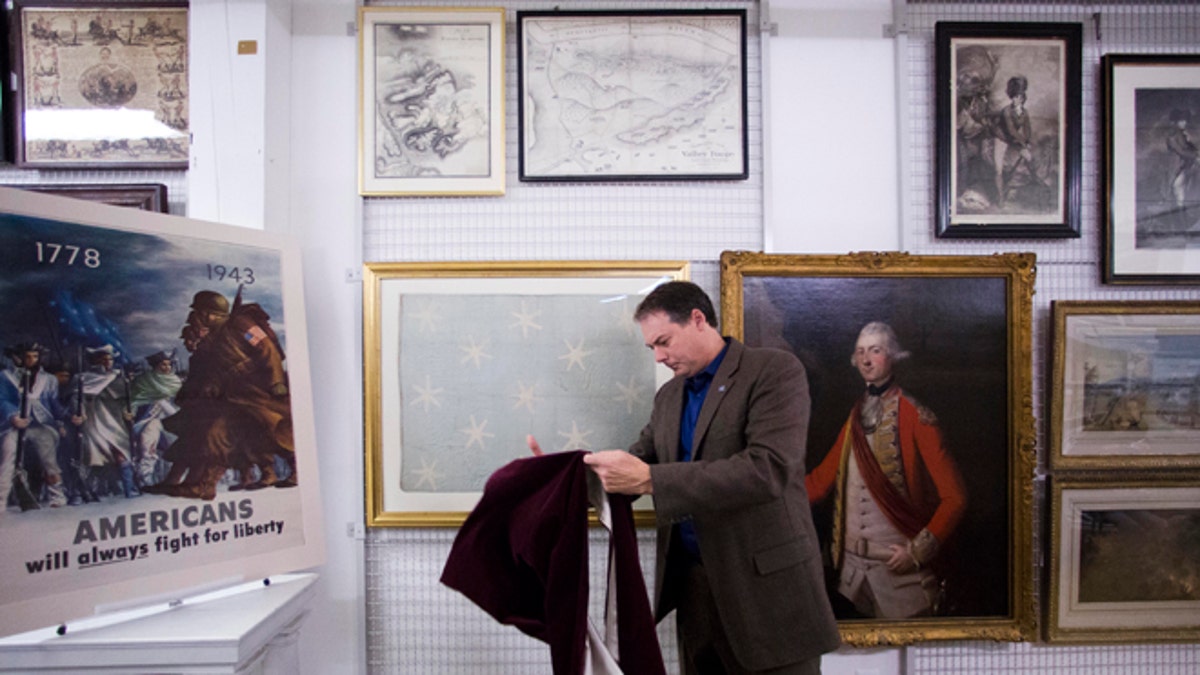
June 5, 2014: In this photo during an interview with the Associated Press Scott Stephenson, Director of Collections and Interpretation, uncovers the recently conserved George Washington's flag, which flew to denote his presence at various battles during the war against Britain, at the Museum of the American Revolution's facility near Philadelphia. (AP)
PHILADELPHIA – Even as Congress adopted the Stars and Stripes as the nation's official flag in 1777, another American banner was making history on Revolutionary War battlefields.
The plain blue standard with 13 white, six-pointed stars traveled with George Washington to denote his presence as commander in chief of the Continental Army.
This month, conservators finished preserving the fragile and faded silk banner -- but it won't be seen publicly anytime soon. It's one of thousands of objects waiting for a permanent home at the Museum of the American Revolution, which is expected to open in Philadelphia in late 2016.
The Associated Press was invited to view the flag at a storage facility last week. Museum collections director R. Scott Stephenson said the standard is among the first generation to omit Britain's Union Jack and use stars to represent the 13 colonies.
Saturday marks the Colonial-era date when lawmakers approved a flag design using 13 five-pointed stars on a blue field surrounded by 13 red and white stripes. It's credited to seamstress Betsy Ross, whose home sits two blocks from the Revolution museum's future site in the historic district.
Washington's flag first passed through the hands of his sister, Betty Washington Lewis, whose sons served their uncle during the war and afterward as private secretaries. Descendants donated it to the Valley Forge Historical Society -- the museum's predecessor organization -- in 1910.
The standard measures about two feet by three feet, and was likely carried on a pole by a member of the cavalry before being planted wherever Washington made camp, Stephenson said.
Dye and fabric analysis indicate the delicate textile dates back to the late 18th century, said Virginia Jarvis Whelan, a conservator who helped preserve it. The new framed display uses special glass to filter out damaging light and better mounting to support it, she said.
"It's got so much meaning behind it, and its fragility just directs you to want to take care of it," Whelan said.
The flag eventually will join other historical objects like swords, pistols, canteens and documents to help tell the story of the War of Independence. Incidentally, the museum's marquee exhibit is a much larger piece of fabric related to Washington: the tent that served as his wartime home and command center.
Historians hope the flag's display might generate more leads on its use and significance, said Susan Schoelwer, senior curator at Washington's home in Mount Vernon, Virginia, who worked with the museum to authenticate it.
"You never know when another piece of evidence will turn up," Schoelwer said. "Even after 200 years of research on this material, there are still exciting discoveries to be made."









































